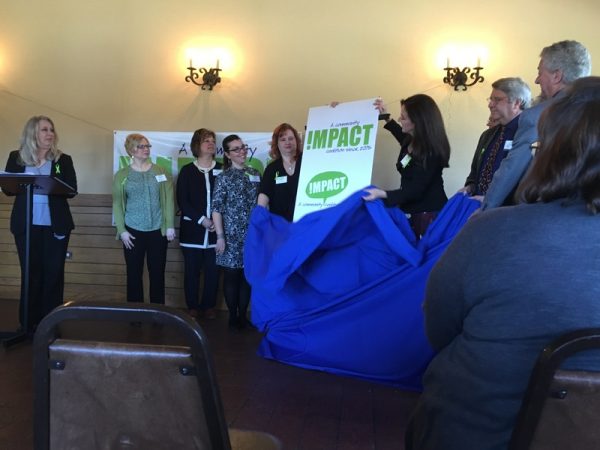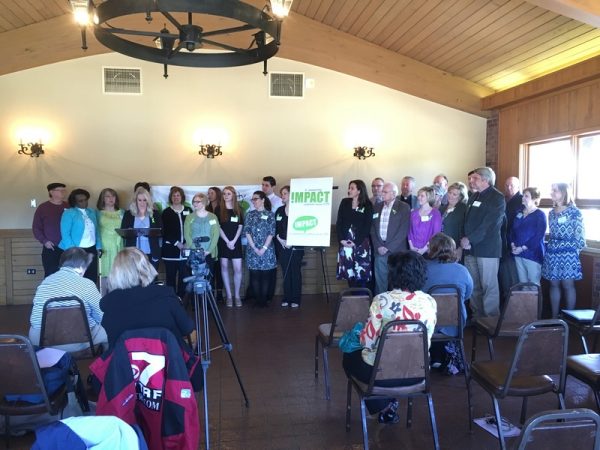Ohio County, and particularly Wheeling, has a long history of its citizens producing alcohol & tobacco products, and also consuming those products. At one point, according to In Wheeling Magazine, the city had 16 breweries, 2 stogie factories, 7 known brothels and 24 gambling houses. Bars were probably too numerous to count. Alcohol and tobacco products are no longer produced in Wheeling on a grand scale, but gambling, substance abuse and prostitution is a legacy that lives on. And with it the values that protect substance use and other risky behaviors still exist today, and in fact are embedded in the community. These values, in turn, send a message of low harm perception to young residents.
Founded in 2005 in part to counter these effects of local history, the Ohio County Substance Abuse Prevention Coalition (OCSAPC) has worked to free the local area from the grip of alcohol and drug abuse. Beginning immediately, the group will start a new chapter under a new name- the Community Impact Coalition. The name, as well as an accompanying logo, was chosen to stress the dynamic nature of the coalition’s approach, which focuses primarily on the prevention of substance abuse before it has a chance to ruin lives. The coalition’s targets of alcohol, marijuana and opiates remain the same, however, the name change reflects their growth over the years and their potential to expand their reach beyond primary prevention and into harm reduction or other contributing factors to substance abuse.

Within the past 5 years, Impact has adopted strategies that strive to expand positive community norms that already exist or are unknown. The old prevention strategies showing gory details of substance abuse gone awry of the 1980’s and 1990’s were found to be ineffective with young people. Statistically, 7 out of 10 Ohio County 15/16 years olds do not use alcohol. This statistic illustrates that substantially more than half do not drink alcohol. When youth and even adults think most teens are engaging in underage drinking, they are incorrect and are often surprised to learn the truth. The group promotes the norm that most kids do not drink alcohol or smoke marijuana, rather than try to convince youth not to abuse substances by showing them negative consequences which did not work in the past. Many times the negative approaches used in the past inadvertently promoted the use of the substances rather than encouraging non-use.
The Community Impact Coalition is a community-based organization consisting of healthcare professionals, law enforcement, schools, substance abuse specialists, youth-serving organization, media, business members, faith community leaders, civic volunteers, parents, youth and other concerned citizens who choose to dedicate their time to improving the lives of youth in the local area. Impact meets quarterly and has work subgroups that meet monthly. The fiscal and administrative agent to the grants that support prevention programming is Youth Services System, located in the historic Hazel-Atlas Building in East Wheeling. Impact’s Steering Committee reviews current local trends, statistical data and science based strategies while formulating programs with local partner organizations.
Impact uses what is known as a 12 sector approach. They have a community representative for each sector listed above including: Chief Shawn Schwertfeger (Wheeling Police Department), Dr. William Mercer (Wheeling-Ohio County Health Deaptement), MaryLu Hutchins (Ohio County Schools), Dr. Dianna Vargo (Ohio County Schools), Caryn Puskarich (RESA 6), Bishop Ralph Dunkin (Retired), Claudia Raymer (Ohio County Family Resource Network), Jody Miller (MADD), Linda Holmstrand (American Lung Association), Betsy Bethel-McFarland (OV Parent), Kathy Kenny (Cardinal Health), Linda Vidoni (RSVP), Kim Watson (Northwood), Vivienne Padilla (Designer), and Wheeling Park High School students Jose Torres, Aubrey Harriman, Shayne Myers, and Angela Stevens. Staff members include Lori Garrett-Bumba, Program Director and Martha Polinsky, Project Coordinator.
The coalition has impacted the community through its strategies formulated to address alcohol, marijuana and opiate abuse (including prescription drugs and heroin). Examples of just some of their strategies include:
- reducing availability of prescription drugs through permanent Rx drop boxes at Wheeling PD, Bethlehem PD and Triadelphia PD and DEA Supported Rx Take Back Days twice a year. The coalition funded and promoted the first permanent drop box in the state of West Virginia, located at Wheeling Police Department;
- increasing awareness to physicians and community members about the role prescription drugs have in the current opioid epidemic West Virginian is experiencing. Impact has advocated for changes in physician prescribing protocols and proper disposal of unused prescriptions;
- increasing youth engagement and education though a summer youth internship program that creates, develops and implements a youth driven media campaign and youth forum that addresses youth substance abuse;
- altering youth/peer perceptions about substance abuse by sponsoring the Students Against Destructive Decision chapter and its activities at Wheeling Park High School;
- reducing alcohol availability to youth by funding Alcohol Compliance Checks by Wheeling PD at retail alcohol establishments;
- influencing community norms through media campaigns;
- increasing age of first use by providing prevention education to Ohio County Schools and local Catholic schools;
- increasing community awareness and resources by developing a state-wide faith initiative called WV Day of Hope which allows faith organizations to implement prevention efforts and support recovery from addiction (Impact partners with the West Virginia Council of Churches to reach organizations across the state);
- educating city, county and state representatives on effective substance abuse solutions;
- providing training to community members young and older to better address substance abuse and implement prevention strategies.
Some of Impact’s expansion of coalition goals came as a result of working with Dr. William Mercer of the health department, one of the coalition’s committed volunteers. Impact supported harm reduction efforts via a needle exchange program. It was organized by Dr Mercer and Ed Nolan of Northwood Health System. Also, the coalition has offered needed supportive training to health department and treatment center employees throughout the region, enabling them to implement Take Home Naloxone Programs. As a result the health department now offers Naloxone Training to individuals who would like to administer the drug to reverse opioid overdoses with friends or family.
Any interested community members and residents are always welcome to join the Community Impact Coalition. We work under the premise that only local people can change local problems. Impact has the support of community leaders and local residents. All community members are needed to make maximum impact. The reoccurring themes of the coalition rebrand were that Impact sees itself as “real” everyday people with a focus on youth and proponents of positive strategies. Impact is a community-up, not leadership-down organization. They believe individuals banded together are the only way to make widespread change in a community.
This article shows only a snap shot of the coalition’s past and present activities. For more information please see the Community Impact Coalition Facebook page or contact them at 304-233-2045.





